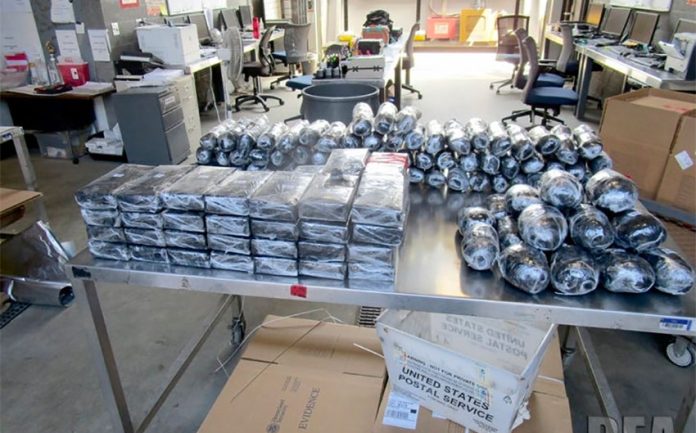Officers of the United States Drug Enforcement Administration (DEA) arrested 750 members of the Jalisco New Generation Cartel (CJNG) throughout the U.S. this week in a series of operations called Project Python.
The DEA said that the goal of the operation was to disrupt the cartel’s capacity to distribute methamphetamine and other drugs in the United States.
A map published by the agency showed the areas in the country where the arrests were carried out. It included such cities as Los Angeles, San Francisco, Dallas, Houston, Texas, New Orleans, Miami, Atlanta, Chicago and New York, among others.
Arrests were also made in New Mexico, Oklahoma, Kansas, Missouri, Michigan, North Carolina, New Jersey and Massachusetts.
Project Python was the product of six months of investigations conducted by U.S. authorities into the operations of the cartel in the country.
However, despite the large number of gang members arrested, a former DEA agent doesn’t see it having a large effect on the day-to-day operations of the cartel’s leader, Nemesio “El Mencho” Oseguera, for whom the U.S. has offered a US $10-million reward.
“They aren’t going to betray him,” said Mike Vigil, former chief of international operations for the DEA. He said that few operatives in the cartel even know where El Mencho is located.
He cited the case of drug trafficker Rafael Caro Quintero, for whom there has been a $20-million reward offered for years, but no one has stepped up to turn him in.
Vigil is convinced the arrests will have little impact on the CJNG’s operations.
“Those arrested are very low-level; many don’t even know they’re working for the cartel,” he said, adding that “the structure in Mexico is still intact,” which means, based on his experience, that the structure in the U.S. can be maintained.
Vigil said that even family members are replaced in El Mencho’s operation without much fuss. Oseguera’s own son, Rubén “El Menchito” Oseguera González, was extradited to the U.S. in February, but Vigil said that he can likewise be replaced easily.
“El Menchito played an important role by being [Oseguera’s] son. He will be replaced,” said Vigil, adding that in the structure of the cartel, “anyone can be replaced easily … even his kids.”
Still, authorities see El Mencho’s inner circle collapsing in on him. His daughter Jessica “La Negra” Johana Oseguera González was recently arrested in Washington, D.C., while appearing before a federal court for a bond hearing for her brother.
Vigil, who led much of the operation to arrest Sinaloa Cartel leader Joaquín “El Chapo” Guzmán, sentenced to life in prison in the United States in July of last year, said that the Sinaloa Cartel is still the “most powerful” mover of drugs into the U.S.
The CJNG, he said, has not only been documented as being extremely violent but it also has a broad distribution network which includes key cities in the U.S. In order to take on such violent organizations effectively, he added, there must be more cooperation between Mexico and the U.S.
He called for a strategy that includes a “broad exchange of information between the United States and Mexico,” and said that the latter must change the culture of impunity rampant in its justice system in order to have an effect on the problem.
Sources: El Universal (sp), Milenio (sp)
